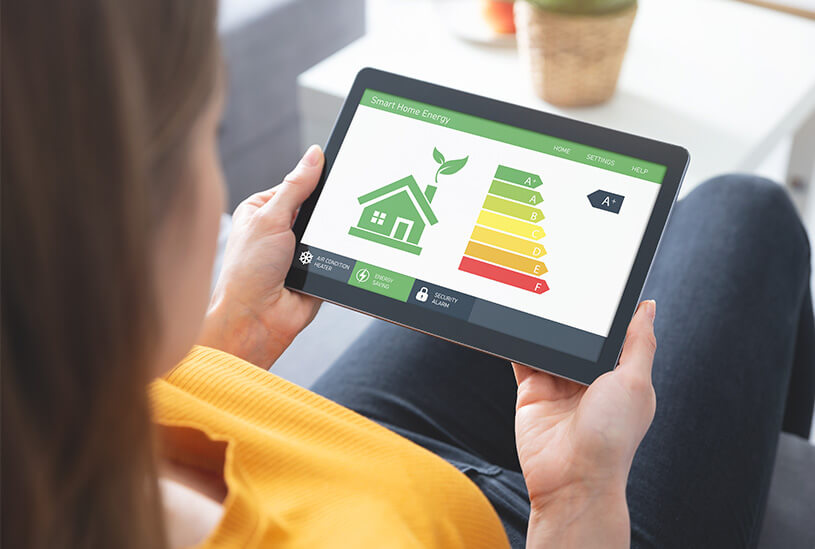Landlords must ensure that rental properties have at least energy certificate classification C by 2030.
The new requirement is part of the government’s “Warm Homes Plan”, which was originally outlined in the election manifesto.
Read on to find out everything you need to know about the new energy efficiency regulations and their potential impact on the rental property market.
Increased energy efficiency standards return with new deadline
The Labour government has revived plans to improve the energy efficiency of rental properties, first put forward by the Conservative Party.
The previous government had originally planned to raise the minimum EPC rating for rental properties from E to C between 2025 and 2028.
However, in September 2023, former Prime Minister Rishi Sunak repealed the changes with the aim of reducing costs for households.
Ed Miliband, Minister for Energy Security and Net Zero Emissions, has yet to reveal full details of Labour’s plans to increase EPC ratings, but the original deadline of 2028 has been pushed back to 2030.
Since 2020, a minimum energy certificate classification of E has applied to all residential tenancies.
Will the 2030 EPC deadline be met for all rental properties?
If landlords continue to improve their energy efficiency at the current rate, it would take until 2042 for all rental apartments to meet the new standards, according to a study by Hamptons.
To achieve the 2030 target, it is estimated that around 340,000 rental apartments will need to be renovated each year to achieve an energy performance rating of at least C.
An analysis of data from the Ministry of Housing, Communities and Local Government by real estate agency Hamptons shows that so far this year, 39 percent of rental properties with new energy performance certificates have been upgraded to a higher category.
More than one in ten (13 percent) fell back to a lower range, while 48 percent saw no change.
Over half (55 percent) of rental properties with a new energy certificate this year have a rating of C or higher.
It is estimated that up to four percent of rental properties do not achieve the minimum EPC rating of C.
Significant costs of increasing the EPC rating for many landlords
A Simply Business study of nearly 1,500 landlords in 2023 found that 42 percent viewed increasing the energy efficiency of their properties as their biggest challenge.
Almost a fifth (18 percent) expected energy efficiency improvements to cost more than £10,000, while a quarter (25 percent) expected the cost to be between £5,000 and £10,000.
There is likely to be a spend cap (a maximum amount that owners must spend on improvements) which could be less than £10,000. As a result, many landlords may spend the maximum amount on improvements without achieving the minimum EPC rating they want.
Higher energy certificates could lead to increased tenant demand
More energy-efficient rental apartments could reduce tenants’ utility costs.
Hamptons’ research shows that a tenant in an average EPC C rated property would pay £499 less per year in service charges than a tenant in an average EPC D rated property.
For typical properties with EPC ratings C and E, the difference is even greater: the estimated annual saving is £1,248.
| EPC assessment | Average size (m²) | Average annual operating costs 2024 |
| A | 78 | £1,046 |
| B | 66 | 711 € |
| C | 68 | 983 € |
| D | 75 | 1,482 € |
| E | 80 | 2,231 € |
| F | 87 | 3,242 € |
| G | 90 | £5,462 |
As rising living costs continue to be an issue for many tenants, demand for properties with higher EPC ratings could increase.
This means that while energy efficiency improvements can be costly for landlords, the costs can be offset in the long term by higher average rents and shorter vacancy periods.
Changes to energy efficiency regulations – what’s next?
First, the government needs to provide more detailed information on how the new rules will work. For example, landlords will want to know:
- How real estate valuation works
- How exceptions work
- what the spending ceiling for improvements will be
- whether additional funding or support will be available
The next step is for the government to come up with new regulations, but there could be a consultation beforehand.
What about energy efficiency ratings in the rest of the UK?
The UK government sets EPC ratings in England and Wales, so the changes mentioned apply to properties in these countries.
However, the Scottish Government conducted a separate consultation on the same topic in 2021. Northern Ireland also has different energy efficiency regulations.
What do you think about the government’s decision to reintroduce changes to energy performance certificates for rental properties? Let us know in the comments.
Additional guidelines for rental property landlords
Photo: Proxima Studio/stock.adobe.com
Get ready with tailored landlord protection
Over 200,000 UK landlord policies, a 9/10 customer rating and claims handled by an award-winning team. Looking to switch or take out a new policy? Request a quick landlord insurance quote today.
This content is for general information purposes only and does not constitute legal, tax, accounting or financial advice. Please seek professional advice from industry-specific professionals who may better understand your business needs. Read our full disclaimer.

